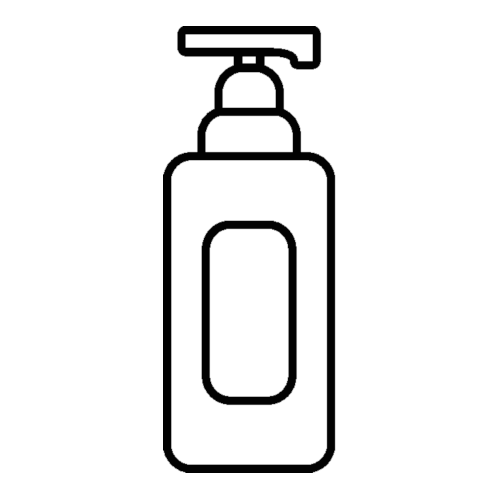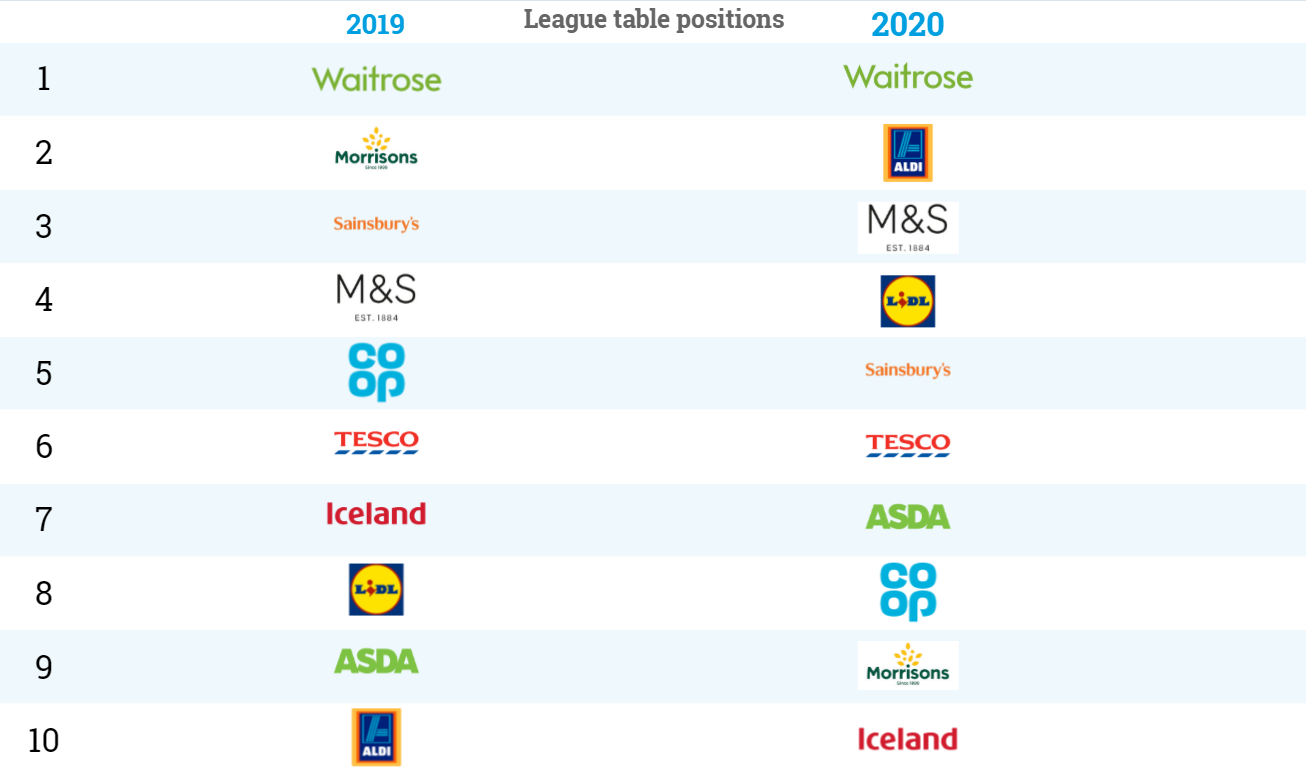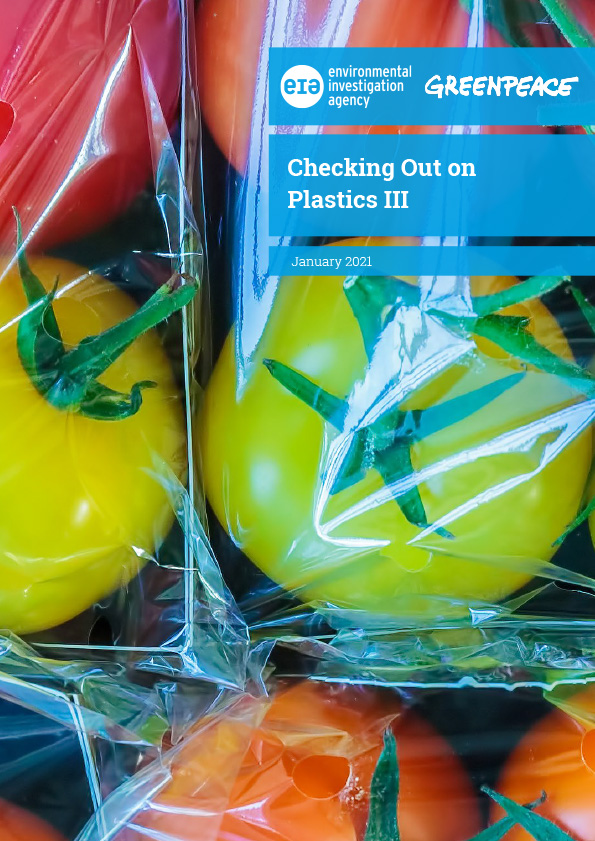Summary
For the third year, the Environmental Investigation Agency (EIA) and Greenpeace UK have surveyed the major supermarkets and grocery retailers in the UK on their efforts to reduce plastic pollution.
In 2018, our survey established a baseline of commitments made by the sector and the 2017 state-of-play for plastic use in stores and supply chains based on the data provided by the retailers. In 2019, we measured progress made and found that, despite the stated aims of many companies, the total volume of plastic packaging had gone up in 2018, not down.
This third report analyses 2019 plastic use across the sector, with a view to understanding whether the companies were able to change course and make a tangible difference in reducing their plastic footprint.
2019
Summary
For the third year, the Environmental Investigation Agency (EIA) and Greenpeace UK have surveyed the major supermarkets and grocery retailers in the UK on their efforts to reduce plastic pollution.
In 2018, our survey established a baseline of commitments made by the sector and the 2017 state-of-play for plastic use in stores and supply chains based on the data provided by the retailers. In 2019, we measured progress made and found that, despite the stated aims of many companies, the total volume of plastic packaging had gone up in 2018, not down.
This third report analyses 2019 plastic use across the sector, with a view to understanding whether the companies were able to change course and make a tangible difference in reducing their plastic footprint.
2019
Scoring criteria
The survey was based on the same categories as in 2018 and 2019 in order to track progress over this period, with minor refinements to questions to improve quality of information
- Reduction in plastic footprint and use of reusables: Progress made since the last survey to reduce single-use items and packaging and expand packaging-free and reusable ranges, assessed where relevant against targets and milestones reported in the 2018 and 2019 surveys.
- Forward-looking commitments on reduction and reuse: Level of ambition of reduction and reuse commitments and targets.
- Recyclability and recycled content: Targets, commitments and progress made on removing non-recyclable plastics and increasing recycled content levels.
- Supply chain and stakeholder engagement: Engagement with suppliers (including branded suppliers, agricultural and fisheries suppliers and regarding pre-production plastic pellets), interactions with staff and customers about reducing plastic use and public policy positions on Government proposals such as Deposit Return Schemes (DRS), Extended Producer Responsibility (EPR) and the plastic tax.
- Transparency: Provision of full data regarding plastic items and packaging footprint, information on recyclability and recycled content and public policy positions.
Scoring criteria
The survey was based on the same categories as in 2018 and 2019 in order to track progress over this period, with minor refinements to questions to improve quality of information
- Reduction in plastic footprint and use of reusables: Progress made since the last survey to reduce single-use items and packaging and expand packaging-free and reusable ranges, assessed where relevant against targets and milestones reported in the 2018 and 2019 surveys.
- Forward-looking commitments on reduction and reuse: Level of ambition of reduction and reuse commitments and targets.
- Recyclability and recycled content: Targets, commitments and progress made on removing non-recyclable plastics and increasing recycled content levels.
- Supply chain and stakeholder engagement: Engagement with suppliers (including branded suppliers, agricultural and fisheries suppliers and regarding pre-production plastic pellets), interactions with staff and customers about reducing plastic use and public policy positions on Government proposals such as Deposit Return Schemes (DRS), Extended Producer Responsibility (EPR) and the plastic tax.
- Transparency: Provision of full data regarding plastic items and packaging footprint, information on recyclability and recycled content and public policy positions.
Recommendations
We recognise that change takes time, but we urgently need UK supermarkets to be standard bearers in driving solutions to the plastic pollution crisis and not allow setbacks from COVID-19 to derail ambitious plans.
Single-use packaging
Recommendations
We recognise that change takes time, but we urgently need UK supermarkets to be standard bearers in driving solutions to the plastic pollution crisis and not allow setbacks from COVID-19 to derail ambitious plans.
Single-use packaging
Reduction targets
Set targets to reduce plastic packaging by 50% by 2025 (against a 2019 baseline) and map out long-term plans for cutting single-use plastic, with shorter term milestones built in. Targets must apply to both branded and own-brand goods and should achieve an absolute reduction (without being tied to sales or growth). Methods for achieving these targets should prioritise removing single-use packaging altogether and shifting into reusable packaging, rather than light-weighting or swapping one single-use material for another.
Eliminate non-recyclable packaging
Urgently eliminate all non-recyclable plastic polymers and packaging formats and make it mandatory for branded suppliers to do the same.
Packaging-free ranges and reuse solutions
Support a wholescale transition towards packaging-free ranges and reuse and refill systems across shop floors, supply chains and product lines nationwide, ensuring price parity, availability, accessibility and awareness.

Collaborate with producers, retailers, governments and NGOs
to create scalable, standardised and reusable solutions, including support for ambitious legislation that rewards plastics reduction, incentivises reuse systems, deposit return schemes and penalises the overuse of plastics.
Address the drivers of single-use packaging
Promote shorter supply chains and seasonal produce; ban excessive packaging used for marketing objectives; challenge the ‘convenience’ culture underpinning the wasteful on-the-go market. Ensure the policies to address these drivers are coherent across the entire business strategy.
Refill at home
Collaborate on efforts to create an enabling infrastructure with suppliers and reverse logistics to implement refill at home systems, setting targets and strategies in this area with measurable timelines for implementation.
Non-conventional plastics
Avoid false solutions involving non-conventional plastics (bio-based, biodegradable, compostable). In cases where biodegradable packaging must be used, it should be certified to British Standard EN 13432 and only sold in municipalities which have the appropriate industrial composting/anaerobic digestion facilities. We strongly recommend avoiding these materials due to lack of infrastructure to manage them appropriately.
Remove hazardous chemicals
and materials from products and choose toxic-free materials and products.
Single-use plastic items
Single-use plastic items
End sales and free provision of single-use items
This includes, but is not limited to, plastic cutlery, bottles, cups and sanitary items. The level of ambition should extend beyond items slated for removal as part of single-use plastics legislation and should not be considered as a simple case of substituting single-use plastic for another material.

Stop selling single-use plastic water bottles
End sales of single-use plastic bags and increase the minimum price of plastic ‘bags for life’…
to at least 70p to encourage reuse before a phase out. Offer reusable produce bags.
Working with the supply chain
Working with the supply chain
Robust engagement with branded suppliers
Engage with brand suppliers on reducing single-use plastics and packaging by requesting target-setting, sharing of best practices and collaborating on refillable packaging ranges. De-list companies unwilling or unable to adapt.
Secondary and tertiary packaging
Introduce a comprehensive policy requiring reusable containers for transportation, storage and distribution.
Monitoring plastic waste treatment
Look at the treatment and destinations of plastic waste in supply chain operations and monitor progress in annual reporting.

Plastic pellet loss
Introduce requirements for suppliers to implement best practice measures to prevent plastic pellet loss, with third party auditing and reporting requirements. We urge supermarkets to ensure that certification to the new Publicly Available Standard (PAS) on pellet loss, due to be adopted in mid-2021, is a universal obligation for all relevant actors in their supply chain.
Agriplastics
Work with fruit and vegetable suppliers on the reduction and responsible management of plastics used on farms to prevent pollution of soil, rivers and oceans. Formalise this into a policy enforced across all suppliers.
Fisheries-related plastic waste
Work with fishery suppliers to implement measures to prevent abandoned, lost and discarded fishing gear and other plastic waste from fishing vessels. Adopt sourcing policies that incorporate best practices for the prevention of lost fishing gear, such as those advocated by the Global Ghost Gear Initiative, and urge certification schemes to include compliance measures related to this issue.
Engagement with staff and customers
Engagement with staff and customers
Staff, customer and community engagement campaigns
Utilise all internal and external communication channels to empower staff and customers to reduce plastic, addressing financial and non-financial barriers to behavioural change.

Transparency
Publicly disclose full plastic footprint breakdown
on websites and within annual, audited reports. Investors and shareholders in these companies are encouraged to promote these recommendations through their engagements. We expect to see transparency and consistency on unit, weight and component reporting.
Engage with policy makers to support reduction of plastic and single-use packaging
Engage individually and through industry bodies to promote ambitious policy reform significantly reduce single use packaging and shift into reusable ranges.
Engagement with Government and policymakers
Engagement with Government and policymakers
This year’s survey has shown that UK retailers are broadly supportive of greater regulatory efforts to level the playing field and underpin their efforts to reduce plastic pollution. We recommend the retail sector continues to engage with the Government on progressive legislation and policy, including:
- urging the Government to use the Environment Bill to set legally binding targets to reduce single-use plastics by 50% by 2025 and to introduce mandatory corporate reporting on plastic reduction in order to create a level playing field for all sections of the grocery industry;
- calling on the Government to pursue, incentivise and support standardisation of reusable packaging, including providing funding support for trials of new systems/reuse innovation;
- asking for support via financial incentives to help the sector shift over to reuse. For instance, use Enhanced Capital Allowance (ECA) schemes to assist companies with investments in plant and machinery for reuse applications;
- ensuring that the new Extended Producer Responsibility (EPR) requirements are designed to increase reuse and reduction of packaging as well as recyclability, in line with the waste hierarchy. This should be achieved through a combination of reuse and reduction targets and modulation of fees to incentivise eco-design, reuse and reduction and penalise single-use packaging. Proceeds from producer fees can be used to fund trials of new reuse and refill systems, allowing the retail sector to take advantage of the economic opportunities of reuse;
- continuing to push for an all-in Deposit Return Scheme (DRS) for drinks containers which allows for the further uptake of reuse and refill systems as well as improving recycling;
- joining other companies and the UK Government in the lead up to the United Nations Environment Assembly in 2022 in supporting the call for a global treaty to combat and prevent plastic pollution and working with the industry to input into an ambitious treaty design during negotiations;
- working with the Government to implement a closed loop integration system for recycling plastic materials from supermarkets as part of the transition to a circular economy.
Checking Out on Plastics III
The full report
Download the full report, detailing the results of our survey.


